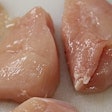Oklahoma State University hosted a carcass management training in mid-May to teach animal production industry and U.S. Department of Agriculture professionals the basics of composting.
The federally funded, multi-state program, Train-the-Trainer, teaches attendees how to use composting to dispose of animal carcasses in the event of an animal disease outbreak.
“When you have a disease outbreak, the USDA’s policy is to stamp that disease out,” said Mark Hutchinson, extension professor for sustainable ag with the University of Maine and head of the program. “Those animals have to be disposed of, and through the composting process, we can do it in an environmentally friendly and sustainable way and end up with a product that can be recycled and put back into the earth.”
The training, held in Perkins May 17-19, was the third session conducted in the U.S. through a farm bill sponsored by the USDA-National Animal Disease Preparedness and Response Program. Attendees included a mix of USDA staff and individuals from private industry.
The training prepared attendees to go out and assist producers in the management of carcasses through composting by teaching them what to look for in the field, how to set up windrows with the appropriate size and arrangement, how to manage carbon materials they will need, what equipment is required and how to dispose of different types of carcasses and other materials to deactivate the disease.
“Most of the time we are a little bit heavier on state and federal employees, but here in Oklahoma, we’ve been really fortunate to have private industry really buy into this. That’s great from our standpoint because that’s who is going to be the best end user of this information,” Hutchinson said.
Hutchinson said deep burial and landfill disposal are other means of carcass disposal, but both cause environmental issues. Composting is a 28-day process for poultry, but it is the most environmentally friendly and sustainable practice for mass carcass disposal. The compost is added to soil, which changes its structure by adding organic matter and fertility to it.
“Our goal is to inactivate the virus, do it in a safe and environmentally friendly way and get our producers back in business,” Hutchinson said. “They cannot do that until they are cleared through environmental testing and these materials have been handled appropriately so that the virus has been inactivated.”
Jon Tangen, a veterinarian with Hanor, a pork production company in Enid, said African swine fever was confirmed in the Dominican Republic last year, a nation right next door to the U.S. that has close ties with importing and exporting multiple products, including pork. African Swine Fever cannot infect humans, so it is not a public health risk, Tangen said, but over 30% of the pork produced in the U.S. is exported each year. Export markets for pork would be eliminated if the U.S. was classified as positive for swine fever, which would drastically affect pork prices.
“We are going to be able to better prepare for our company’s future through what we learned in this training. The threat of foreign animal diseases is real in all species, and it’s on our doorstep right now,” Tangen said. “If we were to experience an African Swine Fever outbreak, it would impact more than just us, and we would need to manage it properly for our pigs, our Oklahoma neighbors and our nation."


















